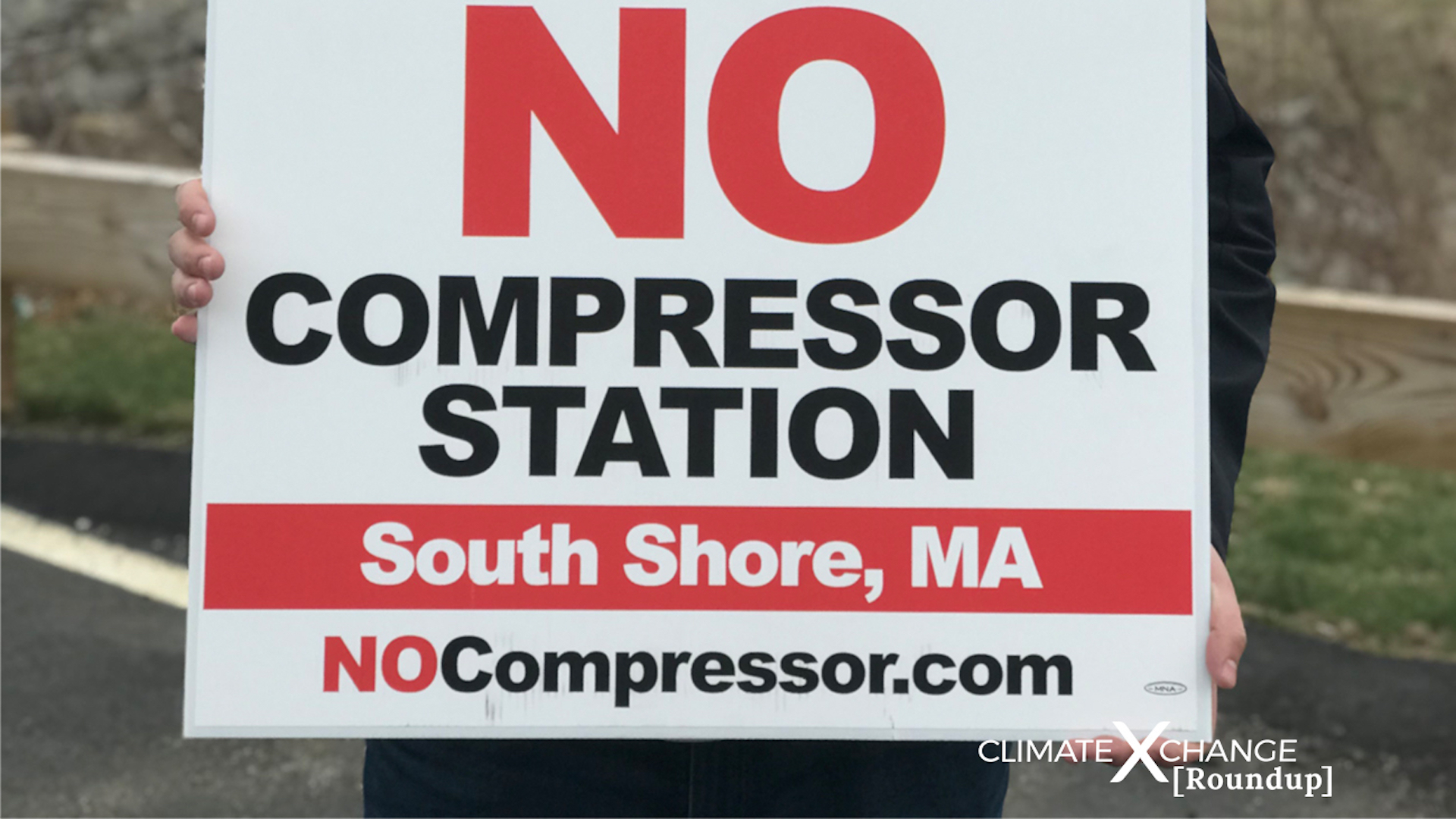[ Not a subscriber? Sign up here ]
INTRODUCING MARTHA
I’m excited to introduce Martha Merrow, the first co-author of the Climate XChange Massachusetts Roundup! Currently working as CXC’s Communications Fellow, Martha will assist in increasing our weekly content offering and expanding the reach of the Roundup beyond our 800+ subscribers. Drop Martha a tip, news story, or just say hello at martha@climate-xchange.org.
And make sure you check out her featured piece on the New England Aquarium’s climate work below!
BEACON HILL HAPPENINGS
– Key committee (again) extends the deadline for climate bills, advocates face constricting legislative calendar (Tim Cronin): Today (6/4), members of the Joint Energy Committee voted in favor of extending the deadline for a trio of popular climate bills before the legislature this session. The bills included a House carbon pricing bill (H.2810), a bill to achieve 100% renewable energy (H.2836), and a bill relating to gas leaks and pipeline safety (H.2849/S.1940). The committee was originally required to report on the bills, either favorably or unfavorably, by February 5th, but chose instead to extend the deadline until today (6/4). Facing down this new deadline, the committee chose (again) to extend the timeline for its decision, this time setting a deadline of July 22nd. House Committee Chair Tom Golden, speaking on a webinar hosted by ELM yesterday (6/3), said that his preference was to extend the deadline in light of new emergency priorities on Beacon Hill, including the health and economic crisis caused by COVID-19.
Although the extension gives supporters of the bills more time to advocate for their passage, the legislative window is rapidly closing. The formal end of the current 2019-2020 legislative session is July 31st, after which all bills not acted on would effectively die in committee, and need to be refiled in 2021. Even if reported out favorably by the committee (by July 22nd), the new deadline gives little time for the bills to make it through the House Ways & Means Committee, a critical next step (and possible roadblock) before being voted on by all 160 House members. The bills then need to go before the Senate, which would likely make changes that need to be reconciled with the House, before ultimately needing approval from the Governor. All this essentially has to happen before the July 31st deadline.
The idea of extending the session past July 31st and into August has been floated by legislators, although House Speaker DeLeo and Senate President Spilka have remained quiet on their intentions so far. There are other bills that are farther along in the legislative process, such as the Meschino Roadmap bill (which has been before the House Ways & Means committee since Fall 2019), the Next Generation Climate bills (which passed the Senate in January 2020), and Speaker DeLeo’s GreenWorks Bill (which passed the House in summer 2019).
– Pacheco gas worker safety bill advances (Tim Cronin): A bill filed by Senator Marc R. Pacheco (S.2514) focusing on gas infrastructure and public safety received a ‘virtual hearing’ on Monday (6/1), where members of the public could submit written testimony. “This legislation seeks to improve existing gas infrastructure safety standards by opening the door to tougher penalties for multiple violations,” said Senator Pacheco to the Roundup. “Gas workers deserve to know their workplace has been as safe as possible here in the Commonwealth.” Pacheco, the Chairperson of the Senate Committee on Global Warming and Climate Change, is a longtime advocate for climate action and a vocal opponent of expanding fossil fuel infrastructure in the state.
– “Bottle Redemption Enforcement To Resume In Mass.” (Colin A. Young, SHNS via WBUR): [read the article]
ALL POLICY IS LOCAL
– Federal court vacates Weymouth Compressor’s air quality permit (Tim Cronin): In a surprising Wednesday night (6/3) announcement, the federal 1st circuit court of appeals vacated an air quality permit originally granted to the Weymouth compressor station project by the Baker administration. In a statement from FRRACS, the primary group opposing the compressor said, “it means that the DEP [state Department of Environmental Protection] made the wrong decision, & Enbridge [developer of the compressor] will have to go back and re-evaluate the installation and use of an electric turbine as opposed to a gas turbine.” They went on to say, “It means that although Enbridge may continue constructing, they cannot operate this facility without the air quality permit. And, it gives us more room to fight to stop it from ever operating.”
Despite opposition from every elected official in Weymouth, Braintree, and Quincy, the compressor is currently under construction in Weymouth after receiving key permits from the Baker administration. [Read more about the court’s ruling].
– “Massachusetts city’s residents ‘need to be listened to’ on pollution concerns” (Sarah Shemkus, Energy News Network): [read the article]
– “Opponents Of Proposed Electrical Substation In East Boston File Federal Civil Rights Complaint” (Miriam Wasser, WBUR): [read the article]
– “Trees coming down to clear way for storage facility” (Greta Jochem, Daily Hampshire Gazette): [read the article]
– “Massachusetts hopes ‘localized approach’ to GHG inventory can spread”(Chris Teale, Smart Cities Dive): [read the article]
– “Poll Shows Wind Favored to Replace Mystic Plant’s Power” (Colin A. Young, State House News Service): “About 60 percent of people asked said they would like to see offshore wind energy replace the power that’s generated by the Mystic Generating Station when the Charlestown plant is retired in 2024, according to a new survey conducted by MassINC Polling Group.” [read the survey] [read the article] [$]
LOCAL IDEAS
– “Environmental Perceptions are Important for Driving Action — Here’s Why” by Christian Morris, via Climate XChange: “Conservation has a legacy of focusing on how ecosystems function devoid of human influence. In a world grappling with the climate crisis, this simply does not exist. Among the most threatened and vulnerable ecosystems from this crisis are wetlands, a frequently undervalued landscape where the system’s significance is often overlooked.” Read the full article.
– [Climate Action Twitter thread] by Senator Michael Barrett, via Twitter: “As I read this stunning chronicle of the missteps by MA government in responding to the COVID threat, I can’t help but worry about the missteps we may be making in dealing with global warming…” Read the full thread.
– [Environmental Justice Twitter thread] by Joel Wool, via Twitter: “Reading the court decision vacating, for now, the air quality permit for the Weymouth Compressor station… [it shows why the] legislature is needed to ensure EJ is written into statute…” Read the full thread.
– “COVID-19’s lessons for climate change” by Criag Atlemose, via Commonwealth Magazine.
– “Youth Climate Action Hero” by Judith Holt, via the Sandwich Enterprise.
OUR LOCAL ENVIRONMENT
– “Seabrook Nuclear Plant Gets Back Online Safely After Unexpected Shutdown” (Annie Ropeik, New Hampshire Public Radio): [read the article]
– “One Fish, Two Fish: This Year’s Mystic Herring Count Goes Online” (Barbara Moran, WBUR): [read the article]
– “As Forests Decline Globally, New England Is Not Immune” (Barbara Moran, WBUR): [read the article]
– “Food Waste Worsens Amid COVID-19 Pandemic: How To Curb Waste In Your Kitchen” (Jeremy Hobson and Allison Hagan, WBUR): [read the article]
– “First bald eagle nest spotted on Cape Cod in more than a century, officials say” (Caroline Enos, The Boston Globe): [read the article]
GLOBAL CLIMATE CHANGE
– “Renewable Energy Consumption Beats Coal For The 1st Time In More Than 130 Years” (Roben Farzad, WBUR): [read the article]
-”Your guide to comparing climate change and coronavirus” (Amy Harder, Axios): [read the article]
OFFSHORE WIND
– “Coast Guard favors turbine corridors sought by energy developers” (Colin A. Young, State House News Service): [read the article]
THE GREEN ECONOMY, STUPID
– “Massachusetts’ Solar Industry Chafes at New Land-Use Restrictions”(Emma Foehringer Merchant, gtm): [read the article]
2020 CLIMATE
– “Environmental super PAC to spend $200,000 on Democratic primary ads for Senator Markey” (Jeremy C. Fox, Boston Globe): [read the article] [$]
– “At last, a climate policy platform that can unite the left” (David Roberts, Vox): [read the article]
BEYOND THE BAY STATE
– “Maryland Economists Highlight the Post-COVID Response to Climate Change” (Petra Smeltzer, Climate XChange): [read the article]
CLIMATE TRANSITIONS
– Eugenia Gibbons is joining Health Care Without Harm, beginning June 8th as the Boston Director of Climate Policy. Formerly Policy Director at Green Energy Consumers Alliance, she will be replacing Bill Ravanesi who will retire in July.
– Winston Vaughan, is also joining Health Care Without Harm as their Boston Director of Climate Solutions. He previously worked as Senior Manager of Renewable Energy at CERES, and will be serving in the role currently filled by Paul Lipke.
CLIMATE COMMUNITY FEATURE
Despite layoffs, New England Aquarium’s climate change research continues
by Martha Merrow, Climate XChange
One of Boston’s leading science institutions, the New England Aquarium, is facing new challenges after closing in mid-March in response to the coronavirus pandemic. CEO and President Vikki Spruill says the aquarium hopes to reopen in July with a different business model and agenda, the Commonwealth reports.The aquarium does expect initially to open with limited capacity, approximately 25%, to ensure safe social distancing, according to Spruill.
The aquarium’s ticket sales and event revenue have disappeared; the aquarium relies on ticket sales and events for 80 percent of its revenue. The aquarium, which still has 20,000 animals to take care of, laid off or furloughed half its staff.
The aquarium, which has taken a more active role in the fight against climate change since Spruill took office, is planning a $200 million expansion over ten years. Spruill wants the aquarium to become “a bold advocate on environmental matters, particularly with regard to how people should react to a warming planet,” the Boston Globe reported last year. The outdoor aspects of the expansion will feature exhibits aimed at educating visitors, and practical resiliency measures designed to protect the aquarium against rising sea levels.
While the New England Aquarium may be closed to the public, its conservation science and research programs continue during the pandemic. The Aquarium’s work with the National Network for Ocean and Climate Change Interpretation (NNOCCI)—which equips science educators from 184 institutions across 38 states with powerful communication tools for solution-oriented conversations—is shifting to online programming.
The Aquarium will host a six-week crash course on strategic climate communication during July and August facilitated by network members. Ongoing webinars and happy hours will continue throughout the summer for network members and the public to maintain visibility and learning opportunities. There is also marketing and recruitment underway for a September course.
The public health crisis has also had an impact on the Aquarium’s research work involving the North Atlantic right whale, a species whose shift in migration pattern is an apparent response to climate change. Annual fieldwork in the Gulf of St. Lawrence has been canceled due to the pandemic.
“To lose a year of data collection in that area will mean a gap in the overall right whale story,” said Amy Knowlton, Senior Scientist with the Aquarium’s Anderson Cabot Center for Ocean Life. “We’ve been collecting valuable information on the recently emergent right whale presence in the Gulf of St. Lawrence and collaborate with oceanographers who are monitoring the right whales’ food resources.”
Aquarium researchers hope to continue their Bay of Fundy surveys later this summer, representing a 40-year longitudinal study on right whale use of that habitat which has become much more variable in the past 10 years with climate change.
Spruill says the aquarium can’t stay silent as the pace of global warming threatens oceans. She calls climate change the “defining issue of our time.”
In an episode of the Codcast, Spruill drove home the importance and need for science literacy. “We face enormous threats on our planet and certainly in the city of Boston, where sea level is expected to rise 3 feet in the next 50 years,” she said. “We are a major urban waterfront city and we need to be coming together in some new and different ways, looking at science, listening to science, stop fighting about how we got here and help educate folks to some of these new realities.”
Spruill, president of the Museum of Science Tim Ritchie, and the leaders of other major cultural institutions urged Congress to approve $6 billion to support nonprofit museums and cultural institutions. Spruill said only $5 million was appropriated. She said she doesn’t see additional revenue coming from the federal government and state support is far from certain.
Spruill said the visitor experience at the New England Aquarium will still revolve around the multistory giant tank that allows visitors to view ocean creatures from feet away. But she says many aspects of the aquarium experience will change. “There is no doubt it will be a different visitor experience, but we are focused on being the Aquarium people love—a source of joy and inspiration, a place of science and education, and an advocate for our blue planet that inspires others to care about our ocean,” Spruill said.
ROUNDUP REDUX
Missed the last CXC Roundup? Here are the top three climate headlines from last week:
- Massachusetts legislators call on Liberty Mutual to cut ties with fossil fuels
- Youth climate coalition holds virtual lobby week this week:
- 18 state groups ask House leadership to advance Meschino Roadmap bill
Read the full Roundup here from May 28th, 2020 here.
FOR MORE CONTENT from us subscribe to the Climate XChange Newsletter (Fridays, weekly) and check out the Cooler Earth podcast (new episodes coming soon!).









